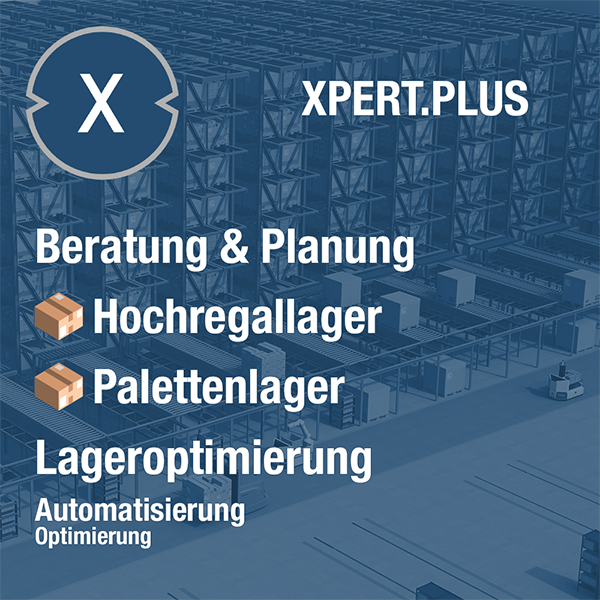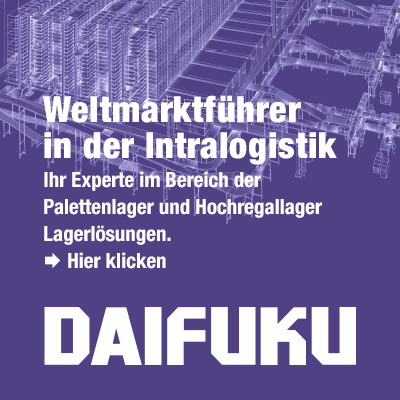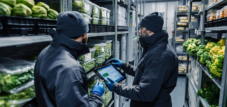Refrigerated logistics in the USA: Challenges and a comparative look at fresh logistics and cold logistics in other nations
Xpert pre-release
Language selection 📢
Published on: January 5, 2025 / Update from: January 5, 2025 - Author: Konrad Wolfenstein

Refrigerated logistics in the USA: Challenges and a comparative look at fresh logistics and cold logistics in other nations - Image: Xpert.Digital
Refrigeration logistics in the USA: challenges and international comparison
The refrigerated logistics industry is an indispensable part of the global economy and plays a crucial role, particularly in the USA. The increasing demand for fresh, chilled and frozen food as well as pharmaceutical products requires innovative solutions and a robust infrastructure. This report analyzes key challenges and trends in U.S. refrigerated logistics and compares them with other countries to provide a comprehensive picture of the current situation and future developments.
Challenges of fresh and refrigerated logistics in the USA
Refrigerated logistics in the United States faces a variety of challenges driven by the country's size, economic constraints, and global trends:
- High infrastructure costs: The construction and maintenance of cold storage and transportation requires significant investments. To remain competitive, companies must invest in modern technologies that not only ensure efficiency but also sustainability.
- Environmental regulations: Given rising CO2 emissions in refrigerated transport, the industry is under pressure to introduce environmentally friendly technologies and operating processes. Sustainability is not only a regulatory requirement, but also an important prerequisite for consumer acceptance.
- Quality assurance: Ensuring product quality over long transport routes is a constant challenge. Excessive temperatures or inadequate storage conditions can cause significant losses.
- Skilled labor shortage: Refrigerated logistics requires highly qualified workers who are familiar with automated systems and digitalized processes. However, the increasing shortage of skilled workers is hindering the industry's growth and efficiency.
- Rising operating costs: Fuel prices and energy expenditure are a significant cost driver. Efficient logistics systems are required to cushion rising costs.
- Supply chain disruptions: Events such as the COVID-19 pandemic have exposed the vulnerability of global supply chains. Delays and disruptions in logistics have shown the importance of flexible and resilient networks.
- Growing Demand: The market for temperature-controlled products is growing rapidly, putting pressure on the industry to quickly scale its capabilities and processes.
The refrigerated logistics infrastructure in the USA
The US has one of the most advanced refrigerated logistics infrastructures in the world. This infrastructure is designed to meet the enormous demands of a large-scale market.
Cold storage
The US has an extensive network of cold storage facilities strategically positioned near manufacturing centers, ports and major cities. These warehouses are equipped with the latest technology including:
- Automated storage and racking systems (AS/RS): They maximize storage space and increase efficiency.
- Temperature and humidity control systems**: These systems ensure that products remain in optimal conditions throughout the storage period.
- Energy efficiency: Many cold storage facilities rely on sustainable energy solutions such as solar panels and energy-efficient cooling systems.
In addition to Daifuku, companies such as Americold Logistics and Lineage Logistics are also active in the market and are setting standards in terms of capacity and technology. Daifuku, the world market leader and expert from Japan for logistics solutions, makes significant contributions, particularly in the area of fresh and refrigerated logistics in rural supply and urbanization.
However, despite advances, the cold storage industry faces challenges such as high energy costs and the need to create different temperature zones for different product categories. The integration of innovative technologies and sustainable solutions is crucial to counteract these challenges and further increase efficiency in refrigerated logistics.
Suitable for:
- Cold Chain Logistics Strategies: For more sustainable cold logistics and frozen logistics in global industrial logistics
- Leading Xpert blog in the area of cold chain logistics (fresh logistics/refrigerated logistics)
Means of transport
Refrigerated transport in the USA is carried out primarily via trucks equipped with the most modern refrigeration systems. Technologies like:
- Temperature monitoring systems: They enable continuous monitoring during transport and can immediately report any deviations.
- Electric and autonomous refrigerated vehicles: These systems, like Carrier Transicold's Vector eCool, reduce emissions and improve efficiency.
- Telematics systems: They help optimize routes and help reduce fuel costs.
Additionally, advanced packaging solutions such as insulated containers and ice packs are essential to maintain cold chain integrity during transportation.
International comparison: USA vs. Europe and other regions
Size and complexity
The USA differs greatly from Europe in terms of its geographical size and decentralized population distribution. While regional logistics solutions dominate in Europe, US refrigerated logistics requires a much more complex infrastructure in order to efficiently manage longer transport routes.
Technology use
The US is a global leader in integrating automation, data analytics and IoT into refrigerated logistics. European countries, on the other hand, focus more on sustainability and regional efficiency.
Efficiency and sustainability
The efficiency of refrigerated logistics in the USA is high, but often comes with high costs. Europe, on the other hand, is characterized by a more efficient use of resources, in particular by greater use of rail transport for temperature-controlled goods.
Fresh logistics in the USA
Fresh logistics, which focuses on perishable foods such as fruits, vegetables, meat and dairy, is a key part of the U.S. food supply chain.
storage
Fresh food is stored in special cold storage facilities that have sophisticated temperature and humidity control systems. These systems ensure that products remain fresh throughout the storage period.
transport
Transport is carried out via refrigerated vehicles that meet strict standards. However, long transport routes represent a challenge, especially when they lead across regions with extreme climatic conditions.
Trends and innovations in refrigerated logistics
The refrigerated logistics industry in the USA is being shaped by several trends that are shaping its future:
- Automation: Advances in robotics and AI lead to more efficient processes in storage and transportation.
- E-commerce: The demand for chilled products in online retail, especially fresh food, requires new logistics models and supply chain strategies.
- Sustainability: Environmentally friendly technologies, such as alternative refrigerants and optimized route planning, are becoming increasingly important.
- Digitalization: IoT sensors and big data improve transparency and control of the entire refrigeration and supply chain.
Refrigerated logistics in the USA is a dynamic and forward-looking industry that faces significant challenges. However, with a highly developed infrastructure, a strong focus on technology and a growing demand for innovative solutions, the industry has the potential to further expand its position as a global leader.
Investments in sustainable technologies, the further development of digital processes and addressing the shortage of skilled workers are crucial to meeting growing demands. The future of refrigerated logistics will be shaped by trends such as automation, sustainability and the increasing importance of e-commerce. Companies that proactively accept these developments will not only ensure their competitiveness, but also make a decisive contribution to a more sustainable and efficient supply chain.
Xpert partner in warehouse planning and construction
From harvest to plate: The key role of refrigerated logistics in the USA
Refrigerated logistics, an invisible but essential pillar of the modern economy, plays a key role in security of supply and ensuring product quality. This is particularly true in the United States of America, a country with an immense geographical extent and an ever-growing demand for fresh and frozen products. Ensuring an uninterrupted cold chain from producer to consumer is crucial to ensure the safety and quality of temperature-sensitive goods. This article highlights the diverse challenges facing the refrigerated logistics industry in the United States, analyzes the country's specific infrastructure, and draws an insightful comparison with other nations regarding their refrigerated logistics and fresh logistics systems, including storage and transportation aspects. In order to draw a comprehensive picture, various research steps were taken, which included a detailed examination of the current challenges, an in-depth analysis of the existing infrastructure, a differentiated comparison with other countries as well as an in-depth look at fresh produce logistics and the identification of current trends and future-oriented innovations in the industry include.
The complex challenges of refrigerated logistics in the USA
Refrigerated logistics in the United States faces a complex web of challenges arising from the country's unique nature and global economic trends. These challenges are diverse and have a significant impact on the efficiency and profitability of the industry.
A significant factor is the immense infrastructure costs. The construction and ongoing maintenance of state-of-the-art cold storage and specialized transportation requires significant financial investment. Companies have to spend significant amounts of money to create modern facilities and operate them efficiently. These investments include not only the purchase of technology and equipment, but also the costs of land, construction and compliance with strict regulatory requirements.
Another critical aspect is the strict environmental regulations. The industry is under increasing pressure to implement environmentally friendly solutions as refrigerated transport, particularly over long distances, is traditionally associated with high CO2 emissions. The development and implementation of sustainable technologies and practices, such as the use of alternative refrigerants and the optimization of transport routes to reduce fuel consumption, are therefore crucial. The industry invests intensively in research and development to find innovative solutions that are both ecologically and economically viable.
Quality control represents another significant challenge. Completely ensuring product quality throughout the entire transport process is of utmost importance, but a demanding task given the enormous distances and the size of the country. Temperature fluctuations, improper handling or delays may affect the quality and safety of the products. Therefore, sophisticated monitoring systems and strict protocols along the entire supply chain are essential.
The increasing shortage of skilled workers represents another problem. Refrigerated logistics requires highly qualified employees who are familiar with the latest technologies and complex processes. This affects both the staff in the cold storage facilities as well as the drivers of refrigerated transport vehicles and the maintenance staff. The lack of appropriately trained specialists can lead to bottlenecks, delays and potential loss of quality. Investments in training and further education programs are therefore essential to counteract this shortage.
The volatile and rising fuel costs place a significant burden on transport costs and thus on the profitability of refrigerated logistics companies. The dependence on fossil fuels makes the industry vulnerable to price fluctuations in the global energy market. The search for alternative drive technologies and the optimization of route planning to minimize fuel consumption are therefore important strategies for controlling costs.
Supply chain disruptions, such as those highlighted by the COVID-19 pandemic, highlight the vulnerability of global supply chains. Unexpected events, such as natural disasters, political instability or global health crises, can lead to significant disruptions in logistics networks and pose major challenges for refrigerated logistics. Developing resilient and flexible supply chains is therefore crucial to increase resilience to such disruptions.
Last but not least, the growing demand for temperature-controlled products is leading to an increased need for refrigerated transport and storage solutions. This trend is further reinforced by factors such as increased health awareness among consumers, the globalization of the food market and the growth of e-commerce in the food sector. The industry must continually adapt to this increasing demand and expand its capacities accordingly.
The expanded refrigerated logistics infrastructure in the USA
The US has a sophisticated refrigerated logistics infrastructure designed to meet the demanding needs of the market. This infrastructure includes an extensive network of facilities and technologies that ensure an efficient and reliable cold chain.
A central element of this infrastructure are the numerous cold storage facilities. The US has an extensive network of cold storage facilities strategically located throughout the country to ensure optimal connectivity to manufacturing facilities, distribution centers and consumption centers. These warehouses are equipped with the latest technology to ensure the quality and safety of the products stored. These technologies include sophisticated temperature control and monitoring systems that enable precise control and complete documentation of storage temperatures. Some of the largest and most influential cold storage companies in the United States include renowned names such as Daifuku, AmeriCold Logistics LLC (headquartered in Georgia), and LINEAGE LOGISTICS HOLDING, LLC (headquartered in Michigan). These companies dominate the market and set standards for the entire industry with their capacity, technological innovations and high quality standards. U.S. cold storage warehouses utilize advanced temperature control and monitoring systems that not only ensure compliance with required temperature ranges, but also provide detailed temperature history data to understand product integrity. Optimized space layout, consideration of specific storage requirements of different product types, efficient use of storage space and strict compliance with relevant regulations are crucial factors for the success of cold storage in the USA. In addition, automated storage systems (AS/RS) are increasingly being used to increase efficiency, reduce storage costs and make optimal use of available storage space. Despite these advances, cold storage facilities also face challenges, particularly with regard to energy efficiency and the need to maintain optimal temperature and humidity conditions for a variety of different products. This often requires setting up different temperature zones within a warehouse to meet the specific needs of different product types.
Suitable for:
Another important component of the refrigerated logistics infrastructure is the highly developed means of transport. Refrigerated transportation in the United States is a significant industry and is primarily carried out using heavy goods vehicles (trucks). The truck fleet is modern and equipped with efficient cooling systems that ensure reliable temperature control during transport. These cooling systems range from simple mechanical refrigeration units to complex, computer-controlled systems that provide precise temperature control. Temperature monitoring systems play a central role in ensuring product quality during transportation. These systems enable continuous monitoring of the temperature in the cargo holds and warn of deviations from the defined temperature range so that countermeasures can be initiated at an early stage. Advanced technologies, such as Carrier Transicold's fully autonomous, all-electric Vector eCool cooling system, are increasingly being used to increase efficiency while reducing harmful emissions. Pre-configured operating settings and integrated telematics systems in modern refrigerated vehicles ensure precise temperature control throughout the entire transport process. In addition, innovative packaging technologies also play an important role in maintaining temperature during transportation. Insulated boxes, cooler bags and ice packs are common tools to further protect products from temperature fluctuations. In addition to road transport, other means of transport such as trains and ships also play a role, especially for transporting large quantities over long distances.
Suitable for:
A comparative look: The US refrigerated logistics infrastructure in an international context
Compared to other countries, especially in Europe, the US refrigerated logistics infrastructure has some specific characteristics.
The sheer size and scalability of the infrastructure is remarkable. Due to its enormous geographical extent and comparatively decentralized population distribution, the USA has a larger and more complex refrigerated logistics infrastructure than most European countries. The need to transport goods over long distances requires an extensive network of warehouses and transport routes.
The USA is also a leader in the field of technology. The United States is a pioneer in the use of advanced technologies in refrigerated logistics, particularly in areas such as automation, sophisticated temperature monitoring systems and data-driven analytics to optimize processes. The willingness to implement new technologies is a key competitive advantage.
The efficiency of refrigerated logistics in the US is generally high, but there are differences between individual companies and regions. Factors such as local infrastructure, traffic density and the regulatory framework can influence efficiency.
The specific requirements of fresh produce logistics in the USA
Fresh logistics, a specialized area within refrigerated logistics, includes the storage and transport of particularly sensitive fresh foods such as fruit, vegetables, meat and dairy products. In the United States, fresh logistics is an essential part of the food supply chain, ensuring the availability and quality of these important products for the population.
Storing fresh food requires special care. Fresh food is stored in specially designed cold storage facilities that have precise temperature and humidity control mechanisms to maintain the quality and freshness of the products for as long as possible. The requirements for storage conditions can vary significantly depending on the type of product.
Fresh food is transported in refrigerated vehicles, which must ensure that the cold chain is maintained without interruption. Transport times and conditions must be carefully planned and monitored to prevent product spoilage.
An international comparison of fresh produce logistics
Compared to other countries, particularly in Europe, there are some notable differences in fresh produce logistics in the USA.
Food quality and safety standards in the United States are generally high, but there are differences in specific regulations and their implementation compared to Europe. The European Union, for example, often has stricter and more detailed requirements in the area of food hygiene and labeling.
Due to the immense transport distances that often have to be covered in the USA, maintaining the cold chain is more of a challenge than in the comparatively smaller European countries. Longer transport times increase the risk of temperature fluctuations and potential loss of quality.
In Europe, the regionality of food often plays a greater role than in the USA. Shorter transport routes and a greater emphasis on seasonal and locally produced goods characterize fresh logistics in many European countries.
Future-oriented trends and innovations in refrigerated logistics and fresh produce logistics in the USA
Refrigerated logistics and fresh produce logistics in the USA are subject to constant change and are significantly influenced by various forward-looking trends and innovations.
Automation is playing an increasingly important role. The use of automation technologies in warehouses and transportation is constantly increasing to increase efficiency, reduce costs and reduce the risk of errors. Robotics, driverless transport systems and automated order picking systems are examples of such technologies.
Booming e-commerce places new and demanding demands on refrigerated logistics, especially with regard to the reliable and timely delivery of fresh food to end customers. The COVID-19 pandemic has further accelerated the growth of e-commerce in the food sector and significantly increased the demand for efficient cold chain logistics for the last mile. Innovative companies are leveraging technology and new delivery models to meet these needs.
Sustainability is a central issue. The industry is working intensively on sustainable solutions to significantly reduce the environmental impact of refrigerated logistics. This includes, for example, the use of more environmentally friendly refrigerants, the optimization of transport routes to reduce fuel consumption and the development of more energy-efficient storage technologies.
Digitalization of the supply chain enables improved monitoring and control of the cold chain. The use of sensors, IoT technologies and advanced data analytics enables real-time monitoring of temperature and other relevant parameters, improving traceability and detecting potential problems early.
Refrigerated logistics infrastructure and the promotion of innovation
Refrigerated logistics in the USA is a complex and dynamic industry that is characterized by constant development and faces a variety of challenges. Despite these challenges, the country has a highly developed infrastructure and plays a leading role in the use of innovative technologies. Compared to other countries, particularly in Europe, there are significant differences in the size of infrastructure, use of technology and efficiency. The industry is significantly influenced by trends such as automation, growing e-commerce and the increasing focus on sustainability.
In order to continue to meet the growing demands of the market in the future and maintain international competitiveness, continuous investments in the refrigerated logistics infrastructure and the promotion of innovations are essential. The consistent digitalization of the supply chain and the development of sustainable solutions are crucial steps in the right direction.
The trends and challenges identified have far-reaching implications for the future development of refrigerated logistics in the USA. Increasing automation and digitalization could lead to changes in the industry's employment structure, while sustainability will play an increasingly important role in shaping future regulatory frameworks and consumer preferences. The industry is faced with the task of proactively adapting to these changes in order to ensure its competitiveness and effectively meet the increasing demands of the market. The importance of resilient and efficient refrigerated logistics will continue to increase in an increasingly globalized world and will make a significant contribution to ensuring the supply of high-quality and safe food.

Xpert.Plus warehouse optimization - high-bay warehouses such as pallet warehouses consulting and planning
We are there for you - advice - planning - implementation - project management
☑️ SME support in strategy, consulting, planning and implementation
☑️ Creation or realignment of the digital strategy and digitalization
☑️ Expansion and optimization of international sales processes
☑️ Global & Digital B2B trading platforms
☑️ Pioneer Business Development
I would be happy to serve as your personal advisor.
You can contact me by filling out the contact form below or simply call me on +49 89 89 674 804 (Munich) .
I'm looking forward to our joint project.
Xpert.Digital - Konrad Wolfenstein
Xpert.Digital is a hub for industry with a focus on digitalization, mechanical engineering, logistics/intralogistics and photovoltaics.
With our 360° business development solution, we support well-known companies from new business to after sales.
Market intelligence, smarketing, marketing automation, content development, PR, mail campaigns, personalized social media and lead nurturing are part of our digital tools.
You can find out more at: www.xpert.digital - www.xpert.solar - www.xpert.plus


























